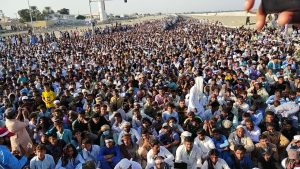The “crown jewel” of CPEC is under an internet shutdown after a crackdown on protests.

Pakistan’s port city of Gwadar, the hub of the China-Pakistan Economic Corridor (CPEC), is in a siege-like situation amid unrest caused by a crackdown against protesting citizens. The city faced a blackout of mobile and internet communications for almost a week. While the mobile networks have been restored, the internet has been shut down since December 28. The Human Rights Commission of Pakistan has taken notice of the unofficial obstruction of information in Gwadar and asked the government to shed its tacit policy of relegating Balochistan to second-class status.
The unrest erupted when police raided a sit-in protest camp and arrested members and leaders of the Haq Do Tehreek Gwadar (HDT) movement (in English: Give Gwadar Its Rights). This was followed by mass demonstrations against the crackdown of the police and paramilitary forces.
The HDT movement, led by local leader Maulana Hidayat ur Rehman, has become a symbol of hope for the people of Gwadar in a very short span of time. The foundation of the movement rests on certain demands that found widespread support among the masses. These include an end to illegal trawling in the sea off Gwadar’s coast, a reduction of security checkpoints in the region, recovery of missing persons, and an easing of curbs on border trade with Iran. These demands have been called genuine by the provincial government, but have not yet been met.
Recently, the intensity of the protests grew after a negotiation team of the government, led by the provincial home minister, failed to convince the movement to end its demonstration. Rehman and his supporters have blamed the government for adopting a “non-serious” attitude towards their demands. In response to this failure, the provincial government applied a kinetic approach to end the two-month long protest in the city. To disperse the demonstrators, police used batons and bayonets against them, which led to a conflict between the security forces and protesters. Reportedly, the ensuing clashes caused the death of a police constable named Yasir in Gwadar. Since then, the government has imposed section 144 under the penal code of Pakistan to prohibit public gatherings and sit-ins in the city for one month.
Making matters worse, the people of Gwadar also feel their identity and ownership of their homeland is under threat. They believe the rapid influx of Chinese workers and businesspeople may destroy their identity by causing demographic change. The Federation of Pakistan Chambers of Commerce and Industry (FPCCI) also endorsed the apprehension of demographic change in their report, which predicted Chinese will outnumber native Baloch by 2048.
The resentments and concerns of the people of Gwadar, which have been simmering for a decade, coalesced in the shape of the HDT movement.
Last year, Rehman led a protest for 32 days under the banner of HDT. The demonstration ended peacefully after the government promised to meet the protesters’ demands. But the broken promises of the government brought Rehman and his supporters to the roads again. This time, he warned the officials to use every means to fight for the rights of the people of Gwadar. He symbolically brandished weapons – implying that, if the government would not take action, the locals might act themselves to protect fishermen from the influential “trawling mafia” exploiting their ocean. Rehman categorically said that he does not demand any mega-projects for the city such as transit lines or metro stations. What he wants – what the HDT supporters want – are simply the basic rights of the people living on the shore of the Arabian sea.
With his rich oratory skills and fiery speeches, the HDT leader has also raised questions over the efficiency of the current government. He has called the government officials incompetent people with zero decision-making powers, saying “They follow what they are dictated” – presumably alluding to military power in the province.
In such conditions, with limited powers available to the local government, it is hard to persuade the agitating protesters. Rehman enjoys local support in great numbers. He has a vigorous tendency to transform grievances into words and gain support. Especially notable is his widespread support among local women. One such example is Masi Zaini, an elderly widow who with her poetry and folk tales has thus far mobilized hundreds of women to join HDT.
With seemingly little interest in responding meaningfully to HDT’s demands, the provincial government has followed the precedent of blaming foreign involvement for the problems. Recently, the home minister also suggested that Rehman’s movement was being supported by foreign forces eager to sabotage CPEC projects. Such statements from the government raise serious doubts as to whether the powers involved are serious about forming a constructive policy concerning the demands of Gwadar’s protesters.
To find a significant solution to the present chaos in the city, it is imperative to keep in consideration the demands of HDT. These demands are being called genuine by the government, and they reflect the essential needs of the local people. From illegal trawling to enforced disappearances, Pakistan’s southwestern province of Balochistan has faced severe systemic injustice and violence. The sea of people in the HDT protest vividly shows how aggrieved the Baloch community is, and how desperately they want to be heard. Rehman clearly enjoys public support. If the demands of HDT are not met, and if the government chooses violent means to suppress their voices, the furious public might unleash still more chaos – jeopardizing the future of CPEC as a whole.
It is important to understand that the iron fist approach has only increased violence in this part of Pakistan. Only peaceful means can bring the port city out of the current chaos.
